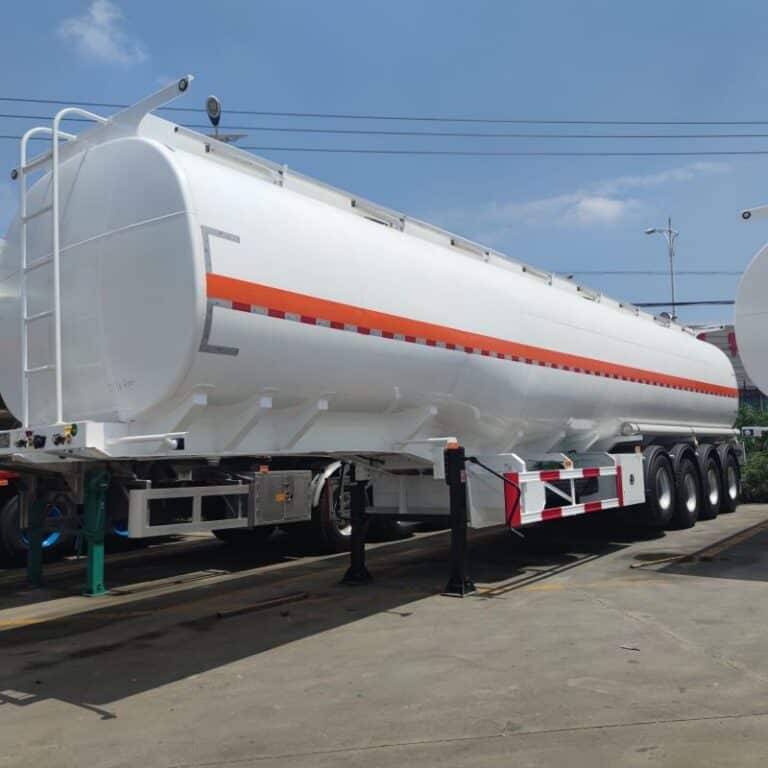At Genron International Trade, we are dedicated to providing high-quality fuel tanker trailers. They ensure safe and efficient fuel transport. But, like any complex machine, fuel tanker trailers can have many issues. These issues need to be fixed to keep the trailers safe and working well. In this article, we will discuss what are the common issues with fuel tanker trailers and how to mitigate them effectively.
Table of Contents
Structural Damage
One of the most common problems with tank trailers is structural damage. This can happen due to accidents, poor road conditions, or overloading. Damage to the structure can weaken the tank trailer. This can cause leaks and spills, which are costly and risky.
To prevent structural damage, the following measures should be taken
Regular Inspections: Thoroughly inspect the tanker’s structure, including the frame, welds, and seams. Look for signs of cracks, dents, or deformation.
Proper loading methods: Ensure that the tanker is not overloaded and that the weight is evenly distributed. Overloading can cause excessive stress on the structure, which can lead to damage.
Quality Maintenance: Use high-quality materials for repairs and maintenance. Ensure that any damaged parts are replaced promptly to avoid further problems.
Corrosion
Corrosion is a major problem, especially for carbon steel tankers. Moisture, chemicals, and salt speed up corrosion. This weakens the tanker and causes leaks. Effective means of mitigating corrosion are therefore required.
- Use corrosion-resistant materials: Choose aluminum or stainless steel tankers. They resist corrosion better than carbon steel.
- Protective Coatings: Apply anti-corrosion coatings to the surface of the tanker. These coatings act as a barrier to protect the metal from corrosive elements.
- Regular Cleaning: Clean the tanker truck regularly, especially after transporting corrosive materials. This helps to remove residues that can cause corrosion.
Begin with a bespoke semi-trailer designed for your exact needs. Whether it’s heavy-duty hauling or specialized cargo, we’ve got the perfect solution to keep you moving forward.
Valve Failure
Valves are critical components of tank trailers, and their failure can lead to major safety hazards. Common problems include leaks, blockages, and failure to open or close properly. The following actions are required to ensure valve function:
- Routine Maintenance: Regularly inspect and maintain all valves, including pressure relief valves, emergency shutoff valves, and control valves. Make sure they are clean and free of clogs.
- Use quality components: Use quality valves that can withstand the special demands of fuel transportation. Poor-quality valves are more likely to fail.
Ensure that operators are trained in the proper use and maintenance of valves. Proper operation can prevent many common problems.
Tire Problems
Tires are another common problem with tank trailers. Problems such as flat tires, uneven wear, and improper inflation can lead to accidents and inefficient operation. The following actions need to be taken to address tire problems:
- Regular Inspections: Inspect tires regularly for wear, proper tread depth, and any signs of damage.
- Proper Inflation: Ensure tires are inflated to the recommended pressure level. Over or under-inflation can cause uneven tire wear and increase the risk of a blowout.
- Alignment and Balancing: Regularly check and adjust the alignment and balance of your tires. Proper alignment helps to evenly distribute the load and prevent uneven wear.
Pollution
Fuel contamination is a serious problem that can affect the quality and safety of transportation fuels. Common sources of contamination include residual fuel from previous loads, dirt, and water ingress. To prevent contamination, the following measures should be taken:
- Thorough Cleaning: Ensure that the tanker is thoroughly cleaned between loads. This will prevent cross-contamination of different fuel types.
- Seal the system: Use a sealed loading and unloading system to minimize the risk of dirt and water entering the tanker.
- Quality Control: Implement strict quality control measures to check the cleanliness of the tanker before loading new fuel.

Static electricity
Static electricity can build up during the loading and unloading of fuel, presenting the risk of ignition and explosion. This is an important safety issue for tank trailers. The following actions are needed to minimize static electricity:
- Grounding and bonding: Ensure that tank trailers are properly grounded during loading and unloading. Use grounding cables and bonding techniques to safely dissipate static electricity.
- Anti-static devices: Install anti-static devices to prevent static buildup. These devices include static dissipators and conductive hoses.
- Operator Training: Train operators on the importance of grounding and the procedures to follow to ensure safety. Proper operating techniques can greatly reduce the risk of static-related accidents.
Regulatory Compliance
Compliance with safety and environmental regulations is critical to the operation of a tank trailer. Failure to comply can lead to legal issues, fines, and operational downtime. To ensure compliance, we offer the following tips:
- Stay informed: Stay informed about local and international regulations related to fuel transportation. This includes safety standards, environmental laws, and transportation guidelines.
- Conduct regular audits: Conduct regular audits and inspections to ensure that your operation complies with all relevant regulations. This includes checking the condition of tanker trucks, safety features, and documentation.
- Invest in training: Ensure that all personnel involved in the operation and maintenance of tank trailers are trained in regulatory requirements. This helps maintain compliance and avoid legal issues.
Conclusion
Understanding and addressing common tanker truck problems is critical to maintaining safety and operational efficiency. At Genron International Trade, we are committed to providing high-quality tanker trucks equipped with the latest safety features to meet operational challenges. By focusing on regular maintenance, using quality materials, and adhering to regulatory standards, you can ensure the longevity and reliability of your tanker trailer. For more information on how to choose the right tank trailer, you can refer to the guide on choosing a tank trailer.


